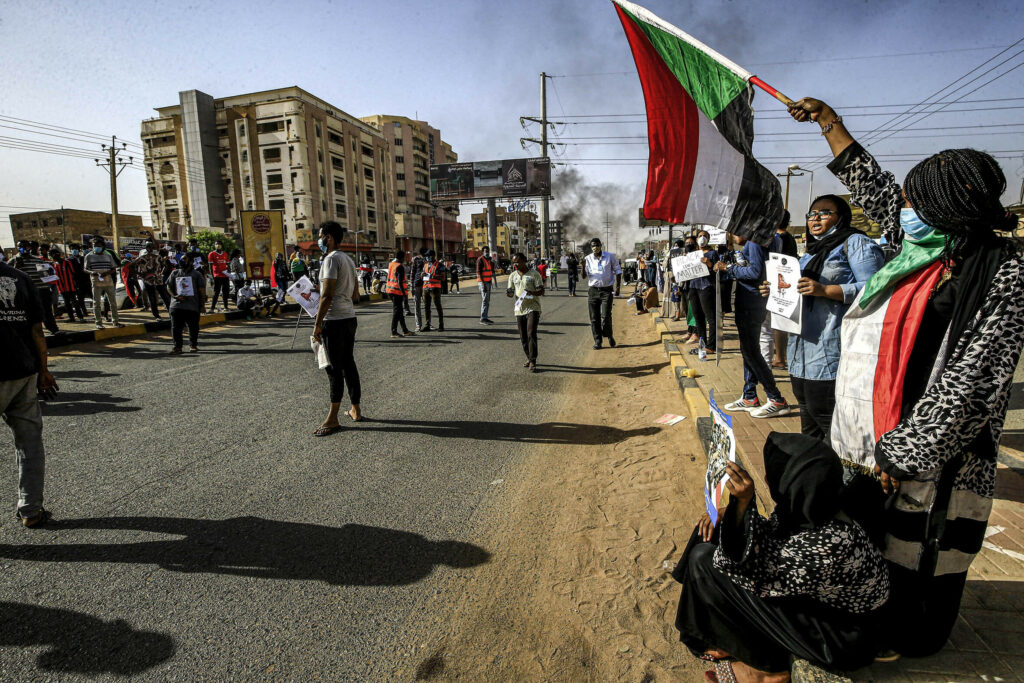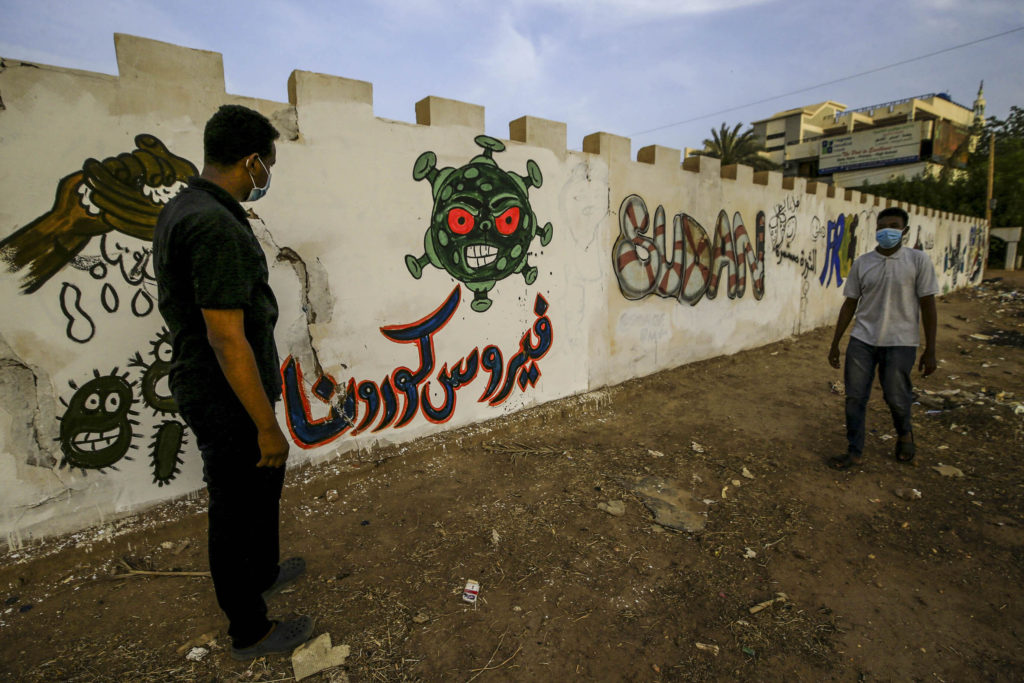Sudanese protesters gather outside the army headquarters in Khartoum on May 6, 2019. - Defiant Sudanese protesters broke their fast on the first day of Ramadan today with chicken soup and beans, vowing to press on with their campaign for a civilian rule. As the call for the evening Maghreb prayer echoed, crowds of protesters gathered at the sit-in area in central Khartoum for iftar after a day of sweltering heat, an AFP correspondent reported. (Photo by Mohamed el-Shahed / AFP)
Few countries in the world were well-prepared for the coronavirus. Even some of the best-funded, most well-equipped health systems have struggled to cope. In hard-hit Italy and Spain, annual government expenditure on healthcare per capita is more than $1 800, more than twice the global average. In the UK, it’s more than $3 000.
Sudan is less prepared than most. Its government spends less than $100 per capita every year on healthcare. It has 10 times fewer doctors per person and eight times fewer nurses than Italy and Spain. In the whole country, there are fewer than 200 intensive care beds, for a population of 42-million people.
But Sudan has one factor that doesn’t appear on World Health Organisation databases and that most countries don’t have — neighbourhood resistance committees. There are hundreds of these committees around the country, typically comprising 40 or so volunteers ranging in age from 17 to 70, although most are in their twenties. They came to prominence early last year during the country’s revolution, when they organised local protest marches against the brutal 30-year rule of dictator Omar al-Bashir.
Throughout the six-month uprising, they braved tear gas, beatings and live bullets fired by security forces that killed dozens of committee members. In the capital, Khartoum, together with hundreds of thousands of other protesters, they staged a sit-in outside military headquarters, which precipitated Bashir’s removal in a military coup.
Bashir was replaced by a transitional government comprising military and civilian arms, which has embarked on an ambitious project to return the country to democracy.
The coronavirus pandemic came at a bad time for Sudan’s fragile transition. The health effects are a test of the competence of the civilian-run ministry of health, but the virus’s economic ramifications are perhaps an even greater threat. With inflation already running at more than 80% and the value of the Sudanese pound plummeting against the dollar, curfews have brought a halt to an economy that was in dire need of a boost.
Rising bread and fuel prices were the spark for the uprising against Bashir, and many Sudanese citizens are worried that if the economic misery intensifies, the risk of a coup by military members of the government or by one of the country’s many armed groups will increase.
 Sudanese protesters, some clad in masks as a precaution due to the Covid-19 coronavirus pandemic, gather to mark the first anniversary of a raid on an anti-government sit-in, in the Riyadh district in the east of the capital Khartoum on June 3, 2020. – Scores of protesters were killed when armed men in military fatigues stormed the sprawling encampment outside Khartoum’s army headquarters on June 3 last year. (Ashraf Shazly / AFP)
Sudanese protesters, some clad in masks as a precaution due to the Covid-19 coronavirus pandemic, gather to mark the first anniversary of a raid on an anti-government sit-in, in the Riyadh district in the east of the capital Khartoum on June 3, 2020. – Scores of protesters were killed when armed men in military fatigues stormed the sprawling encampment outside Khartoum’s army headquarters on June 3 last year. (Ashraf Shazly / AFP)
The neighbourhood resistance committees see themselves as the guardians of the revolution and, to help the democratic process to stay on track, they have mucked in to combat the pandemic. Hashim, an IT engineer who spends his spare time volunteering for a resistance committee in Khartoum, told me that, before the virus hit, they were still holding marches to put pressure on politicians.
“We’ve also been painting revolutionary artwork and writing music,” he said, “and we’re exposing corruption and trying to solve problems with transport and food shortages. We take on any role that advances the revolution’s objectives of freedom, peace and justice.”
Another young resister is Hadara (it’s still not considered safe for them to give me their full names). He and his peers have been making hand sanitisers, using alcohol that is sometimes used for making illegal liquor in a country in which Sharia law is still in place.
“The health infrastructure is hugely depleted,” Hadara tells me. “If Covid-19 explodes in Sudan, I’m afraid the health sector won’t be able to cope. We try to help them because we want the revolutionary government to succeed.”
The hand sanitisers are distributed to street vendors, street children and to Khartoum’s tea ladies, a few of whom can still be found sitting under trees in the dust serving hot drinks to physically distancing customers. The committees have also helped to sterilise markets, mosques and bus stands; to monitor the queues outside bakeries to make sure people stand sufficiently far apart; and to educate their neighbours — in face-to-face sessions, on social media and through street graffiti — about how to protect themselves from infection.
The committees get their information on the coronavirus from government briefings and from the Sudanese doctors’ committee, which was also active during the revolution and whose members were the subject of particularly violent persecution Bashir’s security forces.
 Sudanese volunteers, wearing protective face masks, stand next to a graffiti of the Covid-19 virus in the capital Khartoum on April 8, 2020, as they clean a street during an awareness-raising campaign. – Sudan, which has so far recorded two death out of fourteen confirmed Covid-19 cases, had declared a state of emergency and a near-total closure of its borders on March 16, to tackle the coronavirus pandemic. (Photo by Ashraf Shalzy / AFP)
Sudanese volunteers, wearing protective face masks, stand next to a graffiti of the Covid-19 virus in the capital Khartoum on April 8, 2020, as they clean a street during an awareness-raising campaign. – Sudan, which has so far recorded two death out of fourteen confirmed Covid-19 cases, had declared a state of emergency and a near-total closure of its borders on March 16, to tackle the coronavirus pandemic. (Photo by Ashraf Shalzy / AFP)
Dr Salma, a cardiologist, reports that resistance committees were already helping to renovate hospitals before the coronavirus struck. “Now they are fixing ventilators and hospital beds, too,” she says. “Everyone works on their own speciality, but together we complement each other.”
The committees are also helping to mitigate the economic effects of the disease. They distribute bread, sugar and cooking gas to people who are confined to their homes. They deliver food to street children. And they are helping to identify the poorest families in each neighbourhood — the ones whose survival depends on earning a daily income — so that they can receive help from the government.
Mohamed Kamal, whose family have been in quarantine for two weeks in their home in Omdurman after his father contracted the virus, says support from the resistance committees, some of whose members have been given permission to move around during curfews, has been invaluable. “They’ve been delivering groceries to us,” he says. “Our relatives and friends can’t get to us because of the curfew, so help from within the neighbourhood has been really important.”
Although their work is making a difference, some resistance committee members are keen to get back to more traditional revolutionary activities. “Our task,” says Hashim, “is to keep up the pressure on the government, expose corruption and make sure each minister and state governor is doing the right things to help our revolution to succeed. It shouldn’t be up to resistance committees to deliver coronavirus services. But because the government hasn’t been able to carry out its duties at the local level, we have no choice but to get involved.”
Mark Weston is a consultant and writer based in Khartoum. He is the author of the West Africa travel memoir The Ringtone and the Drum. This piece was first broadcast as a radio feature on BBC Radio 4’s From Our Own Correspondent